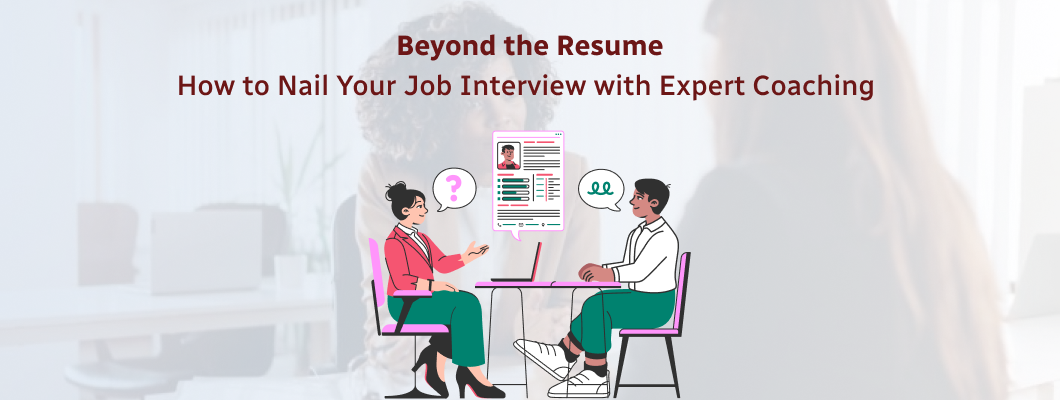Getting your dream job requires more than just sending a great resume. While a great “resume for a job interview” gets you in the door, accepting the interview is what seals the deal. Interviews are where you show not just your skills but your personality, confidence, and fit with the company culture.
“Resume and Interview Coaching” can help bridge the gap between a good application and a great interview performance. Let’s get practical tips, expert advice, and how coaching can help you shine beyond your resume.
Why Go Beyond the Resume?
A great resume opens doors. It highlights your qualifications, experience, and achievements, serving as your initial introduction to potential employers. However, interviews are where critical decisions are made. Many candidates, despite having impressive resumes, fail to translate their written credentials into a compelling interview performance. This disconnect can be a significant obstacle in the job search process. Bridging this gap is crucial for success. Expert coaching helps you:
- Understand the role deeply, including its nuances and unspoken expectations.
- Tailor your responses to employer needs, aligning your skills with their specific requirements.
- Build a personal connection with interviewers, fostering rapport and leaving a lasting impression.
- Articulate your value proposition clearly and confidently.
Interviews test more than just qualifications listed on paper. They assess communication skills, problem-solving abilities, interpersonal dynamics, cultural fit, and your potential to grow within the organization. These soft skills are often as important as technical qualifications in determining a candidate’s suitability for a role.
What Is Resume and Interview Coaching?
Resume and Interview Coaching combines personalized strategies to improve both your written materials and verbal presentation. It focuses on:
- Perfecting your resume for job interview readiness.
- Preparing answers to common and challenging questions.
- Practicing mock interviews.
- Boosting confidence and communication.
- Strategizing for unique scenarios.
This holistic approach ensures you’re prepared for every aspect of the hiring process.
The Benefits of Expert Coaching
Interviewing is a skill that requires practice and feedback. Here’s how coaching makes a difference:
Personalized Feedback
Coaches identify your strengths and weaknesses. They tailor guidance to enhance your unique qualities. This individualized approach ensures you focus on areas that will have the most significant impact on your interview performance.
Industry Insights
Experienced coaches know what employers in your field are looking for. They help you align your responses accordingly. Their up-to-date knowledge of industry trends and hiring practices gives you a competitive edge.
Confidence Building
Nervousness can affect performance. Coaching helps you build confidence and reduce anxiety. Through repeated practice and positive reinforcement, you’ll develop a more assured presence during interviews.
Mastering Behavioral Questions
Behavioral questions can be tricky. Coaching provides frameworks like STAR (Situation, Task, Action, Result) to structure answers. You’ll learn to craft compelling stories that showcase your skills and experiences effectively.
Tailored Strategies
Coaching helps you approach interviews with strategies designed for different roles and industries. This customization ensures you’re prepared for the specific challenges of your target positions.
Mock Interview Simulations
Coaches conduct realistic mock interviews, simulating the pressure and environment of actual interviews. This hands-on practice helps you refine your responses and manage stress more effectively.
Preparing for Coaching
To maximize your sessions, preparation is key. Here’s what you can do:
- Share your resume for job interview purposes.
- Provide job descriptions of the roles you’re targeting.
- Highlight specific concerns or areas of difficulty.
- Be open to constructive feedback.
Preparation ensures you gain the most from coaching sessions.
Tackling Common Interview Questions
Coaching equips you to handle common and challenging questions effectively. Examples include:
Tell Me About Yourself
This is an opportunity to make a strong first impression. Structure your answer:
- Highlight your current role and achievements.
- Share relevant past experiences.
- Connect your skills to the role you’re applying for.
What Are Your Strengths and Weaknesses?
For strengths, focus on traits relevant to the job. For weaknesses, mention areas you’re actively improving and show self-awareness.
Why Should We Hire You?
Frame your answer around:
- How your skills meet their needs.
- Specific achievements that showcase your capabilities.
- Enthusiasm for the company’s mission.
Behavioral Questions
Use the STAR method to answer questions like:
- “Tell me about a time you solved a problem.”
- “Give an example of a challenging situation and how you handled it.”
Mock interviews help you refine your responses to these questions.
Body Language Tips
Nonverbal communication matters as much as your words. Studies suggest that up to 93% of communication is nonverbal. Pay attention to:
Posture
Sit upright but relaxed. Avoid slouching or fidgeting. Good posture conveys confidence and attentiveness. Keep your shoulders back and your feet planted firmly on the ground.
Eye Contact
Maintain steady eye contact. It shows confidence and engagement. Aim for 60-70% eye contact during the conversation. When speaking to multiple interviewers, make sure to address each one.
Hand Gestures
Use natural gestures to emphasize points. Avoid overuse. Keep your hands visible and use open-palm gestures to convey honesty and openness. Avoid crossing your arms, which can appear defensive.
Smile
A genuine smile creates a positive impression. It helps to establish rapport and shows enthusiasm. Practice your smile to ensure it looks natural and sincere.
Mirroring
Subtly mimic the interviewer’s body language to build rapport. This includes matching their tone of voice and speaking pace. Be careful not to overdo it, as obvious mirroring can appear insincere.
Facial Expressions
Be aware of your facial expressions throughout the interview. They should match the tone of your words and the conversation. Avoid frowning or appearing disinterested, even when discussing challenging topics.
Coaches provide feedback on your nonverbal cues to ensure they align with your message. They can help you identify and correct unconscious habits that might detract from your overall presentation.
Showcasing Skills Beyond the Resume
Your resume lists your qualifications. Interviews are your chance to:
- Share detailed examples of your accomplishments.
- Explain how your skills solve specific challenges.
- Demonstrate adaptability and problem-solving abilities.
Coaches help you craft stories that illustrate your impact.
Common Mistakes to Avoid
Coaching helps you steer clear of these pitfalls:
Lack of Research: Know the company’s values, mission, and recent achievements. Familiarize yourself with their products or services, and understand their position in the market.
Rambling Answers: Keep responses concise and relevant. Practice the STAR method (Situation, Task, Action, Result) to structure your answers effectively.
Ignoring Body Language: Negative nonverbal cues can undermine your message. Maintain good posture, make appropriate eye contact, and use confident gestures.
Avoiding Tough Questions: Be honest about weaknesses or gaps. Frame them positively by discussing steps you’re taking to improve or overcome challenges.
Skipping the Thank-You Note: Follow up with a thoughtful email expressing gratitude and reiterating your interest. Personalize it by referencing specific points from the interview.
Neglecting to Ask Questions: Prepare insightful questions about the role, team, and company. This demonstrates your genuine interest and engagement in the opportunity.
How Coaching Works
Coaching typically follows these steps:
Step 1: Initial Assessment
Every great journey begins by knowing where you stand. In the initial assessment phase, your coach will look over your resume and check how ready you are for interviews. This step is key to spot your strong points and areas you can improve. Whether you lack confidence struggle to tell your story, or aren’t sure about your career path, the coach will find out what’s holding you back.
Think of this as a checkup. Just like a doctor needs to know your symptoms before giving you medicine, a coach needs to understand your unique challenges before they can help you. By the end of this step, you’ll have a better idea of what you need to work on.
Step 2: Mock Interviews
Repetition leads to mastery, and practice interviews are key to effective coaching. These simulated sessions copy real-world interview situations allowing you to practice under stress. Your coach may ask typical interview questions such as “Tell me about yourself” or “What’s your biggest weakness?” They might also include behavioral or technical questions specific to your field.
The aim here is not just to rehearse responses but to spot patterns. Do you talk too much? Do you get fidgety when you’re nervous? Are your answers too general? Practice interviews help reveal these habits so they can be dealt with.
Step 3: Feedback and Improvement
After each practice interview, it’s time to get real helpful feedback. This is where the real progress happens. Your coach will look at everything—from what you say to how you say it, including your posture and body language. Did you keep eye contact? Did you sound sure of yourself but still friendly? Did you organize your answers well?
This part is all about getting better. Coaches give you specific tips to help you improve each time. As time goes on, you’ll see changes—not just in how you answer questions but in how you come across overall.
Step 4: Creating a Plan
Once you’ve got the basics down, it’s time to think. Interviews vary; different companies and jobs need different approaches. Your coach will help you come up with custom plans for various types of questions. For instance:
- Behavioral Questions: Find out how to use the STAR method (Situation, Task, Action Result) to tell compelling stories.
- Technical Questions: Create clear and brief ways to explain complex ideas.
- Curveball Questions: Plan how to keep calm and think when faced with surprise questions.
This step makes sure you’ll have a plan no matter what comes your way.
Step 5: Final Preparation
As your interview day gets closer, it’s time to add the final touches. In this last stage, your coach helps you refine every part of your performance. This could mean tweaking answers going over key points, or learning ways to stay calm and handle nerves.
The aim is straightforward: to ensure you enter that interview room feeling sure of yourself and ready. At this point, you’ve done the hard work and sharpened your skills.
The ROI of Coaching
Investing in Resume and Interview Coaching offers long-term benefits. Candidates enrolling in the ostructure.com coaching program are more likely to:
- Land desired roles.
- Receive multiple job offers.
- Advance their careers faster.
The skills you gain extend beyond a single interview.
Final Tips for Success
To excel in your next interview, remember:
- Research Thoroughly: Understand the company’s goals, culture, and recent achievements. Review their website, social media, and recent news articles to gain comprehensive insights.
- Practice Regularly: Rehearse answers to common questions and use the STAR method for behavioral questions. Consider recording yourself to analyze your responses and body language.
- Show Enthusiasm: Let your passion for the role shine through. Demonstrate genuine interest by discussing specific aspects of the job that excite you and align with your career goals.
- Ask Questions: Prepare thoughtful questions about the role, company, and team dynamics. This shows your engagement and helps you assess if the position is the right fit for you.
- Follow-up: Send a personalized thank-you note within 24 hours to leave a lasting impression. Reference specific points from the interview to reinforce your interest and qualifications.
- Prepare for Different Interview Formats: Be ready for various interview types, including phone screenings, video calls, or in-person meetings. Each format requires slightly different preparation and etiquette.
Ostructure’s coaching programs transform these tips into actionable habits, helping you internalize and apply them effectively in real interview scenarios. With expert guidance, you’ll develop a natural, confident approach to showcasing your skills and experiences.
Conclusion
A strong resume for job interview success is only the beginning. Interviews are where you prove your worth. With Resume and Interview Coaching from Ostructure.com, you’ll refine your skills, build confidence, and stand out. Expert guidance ensures you’re ready for any challenge. Don’t leave your career to chance. Invest in coaching that propels personal growth and takes your job search to the next level.



